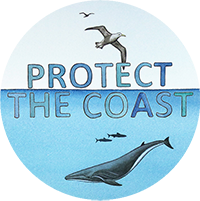by Max Wilbert
Global warming is a crisis, and we must stop the burning of fossil fuels. But alternative energy sources like industrial wind energy are not environmentally benign.
In this video, I speak from the coast of southern Oregon to introduce some of these issues. In Oregon and along the West Coast of the United States, offshore wind energy is rapidly moving towards permitting.
Offshore wind turbine installations can have significant impacts on wildlife and the on the oceans. This can include direct killing of birds and bats, oil spills, destruction of underwater habitat for anchor points, ongoing disturbances from slack anchors for floating turbines, and impacts related to increased ship traffic and sound. As one study put it, “Activities during all phases of wind farm lifetimes produce underwater sound, a concern because high noise levels and/or persistent anthropogenic noise can impact marine life in many ways.”
On the U.S. East Coast, offshore wind energy activity has been associated with an increase in whale strandings and deaths. This may be due to sound (underwater geologic testing involves blasting high-powered sonar at the ocean floor), ships hitting whales, or starvation as whales are scared away from preferred feeding areas. And of course, this impact is being layered on top of previous impacts due to overfishing, ocean acidification, dredging, and historic and current whaling.
I’m just beginning to get involved in this issue, because I love the Pacific Ocean. The western shores of this continent are where I grew up and have had the blessing of watching grey whales migrate offshore. This ocean is sacred. We must protect the whales, fish, sea life, and our entire planet from all sorts of industrial destruction — whether it pretends to be “green” or not.

